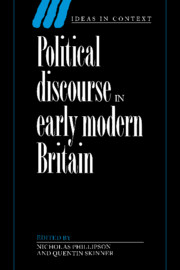Book contents
- Frontmatter
- Contents
- Contributors
- Preface
- PART I
- PART II
- 5 Parliamentary sovereignty: a very English absolutism
- 6 The civil religion of Thomas Hobbes
- 7 The rapture of motion: James Harrington's republicanism
- 8 Casuistry to Newcastle: The Prince in the world of the book
- PART III
- PART IV
- PART V
- A bibliography of the writings of J. G. A. POCOCK
- Index
- Ideas in Context
6 - The civil religion of Thomas Hobbes
Published online by Cambridge University Press: 07 May 2010
- Frontmatter
- Contents
- Contributors
- Preface
- PART I
- PART II
- 5 Parliamentary sovereignty: a very English absolutism
- 6 The civil religion of Thomas Hobbes
- 7 The rapture of motion: James Harrington's republicanism
- 8 Casuistry to Newcastle: The Prince in the world of the book
- PART III
- PART IV
- PART V
- A bibliography of the writings of J. G. A. POCOCK
- Index
- Ideas in Context
Summary
Twenty-one years ago, John Pocock observed with characteristic trenchancy that:
The two books [of Leviathan] in which Hobbes expounds Christian faith and its sacred history are almost exactly equal in length to Books i and ii; yet the attitude of far too many scholars towards them has traditionally been, first, that they aren't really there, second, that Hobbes didn't really mean them.
It comes as a shock to realise that the first version of this essay dates back to 1968. Pocock had already seen the way in which a new understanding of Hobbes might be approached, at a time when most scholars were pre-occupied with the so-called ‘Taylor–Warrender’ debate, and it has taken the intervening twenty years for the rest of us to catch up. He urged that we should take the theology of Books iii and iv of Leviathan utterly seriously, and recognise that though Hobbes's civil sovereign was empowered to interpret Scripture as he thought fit for the needs of civil peace, there was still an independent place for the word of God in Hobbes's thought.
The authority by which the sovereign interprets the prophetic word is clearly distinct from the authority by which the word is uttered; and since the word, its content, its transmission and its authors constitute a history, the secular ruler finds himself inhabiting a history which he did not make – it does not owe its being to the natural reason which produced him – and which indeed looks forward to a time when his authority will be exercised by the risen Christ. […]
- Type
- Chapter
- Information
- Political Discourse in Early Modern Britain , pp. 120 - 138Publisher: Cambridge University PressPrint publication year: 1993
- 20
- Cited by



